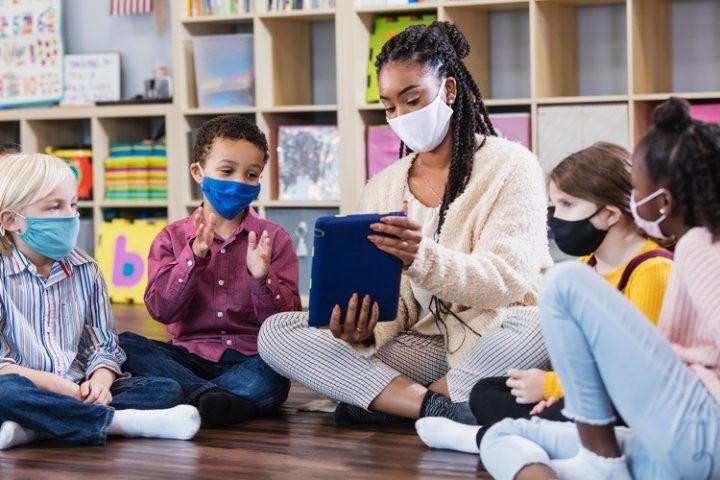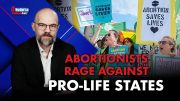
According to new COVID-19 guidance for schools released this week by the American Academy of Pediatrics (AAP), children over the age of two should be required to wear masks in schools, regardless of vaccination status. This position is not only stricter than that taken by the U.S. Centers for Disease Control and Prevention, but is not supported by science.
The guidance indicates support for in-school learning, but claims it is safe when “proper prevention measures” are utilized.
“The AAP believes that, at this point in the pandemic, given what we know about low rates of in-school transmission when proper prevention measures are used, together with the availability of effective vaccines for those age 12 years and up, that the benefits of in-person school outweigh the risks in all circumstances,” the guidance says.
The AAP argues the guidance is based on a number of factors, including the ineligibility of children under the age of 12 to currently receive the COVID vaccine and the difficulties in policing mask-wearing among non-vaccinated versus vaccinated students.
“There are many children and others who cannot be vaccinated,” Dr. Sara Bode, chair-elect of the AAP Council on School Health Executive Committee, said Monday in a statement, as reported by CNN.
“This is why it’s important to use every tool in our toolkit to safeguard children from COVID-19. Universal masking is one of those tools, and has been proven effective in protecting people against other respiratory diseases, as well. It’s also the most effective strategy to create consistent messages and expectations among students without the added burden of needing to monitor everyone’s vaccination status.”
Predictably, Dr. Anthony Fauci, director of the National Institute of Allergy and Infectious Diseases, defended the guidance to CNN on Monday.
“I think that the American Academy of Pediatrics [is] a thoughtful group. They analyze the situation, and if they feel that that’s the way to go, I think that is a reasonable thing to do,” he said.
He elaborated, “When you have a degree of viral dynamics in the community and you have a substantial proportion of the population that is unvaccinated, you really want to go the extra step, the extra mile, to make sure that there is not a lot of transmission, even breakthrough infections among vaccinated individuals.”
Of course, this is a far cry from Dr. Fauci’s first position on mask-wearing, dating as far back as February 2020, when he wrote, “Masks are really for infected people to prevent them from spreading [an] infection to people who are not infected rather than protecting uninfected people from acquiring infection.”
In that same e-mail, believed to have been sent to Obama-era Health and Human Services Secretary Sylvia Burwell, he added: “The typical mask you buy in the drug store is not really effective in keeping out [the] virus, which is small enough to pass through the material. It might, however, provide some slight benefit in [keeping] out gross droplets if someone coughs or sneezes on you.”
As observed by The Federalist, the requirement that children as young as two wear masks is unique to the United States. In Switzerland, for example, children under the age of 12 were exempt from mask mandates, though that age has been lowered to nine for children returning to schools, while England set the exemption for children under the age of 11, and Northern Ireland set it for 13.
The AAP’s position on masks is also stricter than the position taken by the World Health Organization, which advises that children under the age of five should not be required to wear masks.
“This is based on the safety and overall interest of the child and the capacity to appropriately use a mask with minimal assistance,” the WHO’s website reads.
In fact, the WHO advises children between the ages of 6-11 only be required to wear masks when the following factors are applicable:
- Whether there is widespread transmission in the area where the child resides
- The ability of the child to safely and appropriately use a mask
- Access to masks, as well as laundering and replacement of masks in certain settings (such as schools and childcare services)
- Adequate adult supervision and instructions to the child on how to put on, take off and safely wear masks
- Potential impact of wearing a mask on learning and psychosocial development, in consultation with teachers, parents/caregivers and/or medical providers
- Specific settings and interactions the child has with other people who are at high risk of developing serious illness, such as the elderly and those with other underlying health conditions
In a letter sent to CDC director Rochelle Walensky in April of this year, Congressional Republicans challenged the CDC’s guideline that advises children as young as two to wear masks, noting the lack of science to support it.
“The CDC’s mandate that children as young as two years old must wear facemasks is among the most stringent face mask age requirements in the world,” a group of more than two dozen Republican congressmen said in the letter.
“The implementation of these recommendations has had serious consequences for some Americans,” they added, highlighting that small children have been found to account for very little, if any, COVID-19 spread.
“Our review of scientific literature on COVID-19 infections showed ‘evidence for significantly lower susceptibility to infection for children aged under 10 years compared to adults given the same exposure,’” the lawmakers wrote, citing a study that found children had 56 percent lower probability of infection as opposed to adults after contact with another infected individual.
And requiring young children to wear masks for a virus that causes minimal, if any, symptoms for them is especially confusing when considering the dangers that long-term mask use poses to their health. Doctors have challenged the safety of mask-wearing, suggesting that masks are causing healthy people to become sick. A group of doctors in Tulsa, Oklahoma, noted increases in facial rashes, fungal and bacterial infections, and bacterial pneumonia, all of which they’ve attributed to masks in their challenge against the city’s mask mandate.
Even dentists are reporting health problems associated with long-term mask use.
“We’re seeing inflammation in people’s gums that have been healthy forever, and cavities in people who have never had them before,” says Dr. Rob Ramondi, a dentist and co-founder of One Manhattan Dental. “About 50% of our patients are being impacted by this, [so] we decided to name it ‘mask mouth’ — after ‘meth mouth.’”
Florida parents concerned about the potential harm of prolonged mask use for their children sent six face masks to a lab at the University of Florida for analysis, which found five of the six masks were contaminated with bacteria, parasites, and fungi, including three with dangerous pathogenic and pneumonia-causing bacteria.
Meanwhile, the dangers associated with the COVID-19 vaccines are being wholly ignored by the media and the medical community because of the promise that widespread vaccinations will allow Americans to return to their pre-COVID lifestyles. Unfortunately, continued mask requirements and mitigation measures being touted by groups such as the APP and implemented in facilities and cities across the country prove that is untrue.
And according to America’s Frontline Doctors (AFLDS), children should not be subjected to the potentially dangerous COVID vaccines because COVID-19 has proven to be relatively harmless among their population.
“There is no public interest in subjecting children to an inoculation program, in order to protect them from a disease that simply does not threaten them,” stated attorney Lowell H. Becraft, Jr. “Children are inherently incapable of providing informed consent. Neither the children, nor their parents, can possibly give informed consent to these vaccines, since the DHHS Secretary has failed to make the even the minimum statutory disclosures regarding risks and alternative treatments.”
According to concerned doctors with the group, the risks associated with the COVID-19 vaccine, including myocarditis, an inflammation of the heart muscle, far outweigh any benefits of protecting children from a virus that causes minimal, if any, symptoms.
“We’ve never seen this level of side effects for any vaccine without the FDA taking action,” stated Dr. Angelina Farella, AFLDS Pediatric Medical Director. “The Rotavirus vaccine was pulled for 15 cases of non-lethal side effects and the Swine Flu vaccine was pulled for 25 deaths. But now, by the CDC’s own data, we are seeing a 12,000 percent increase in deaths with these vaccines and they’re still talking about giving this to our kids.”




